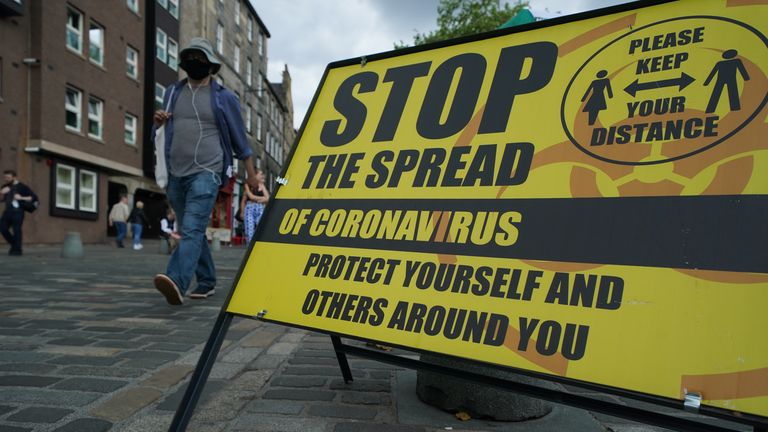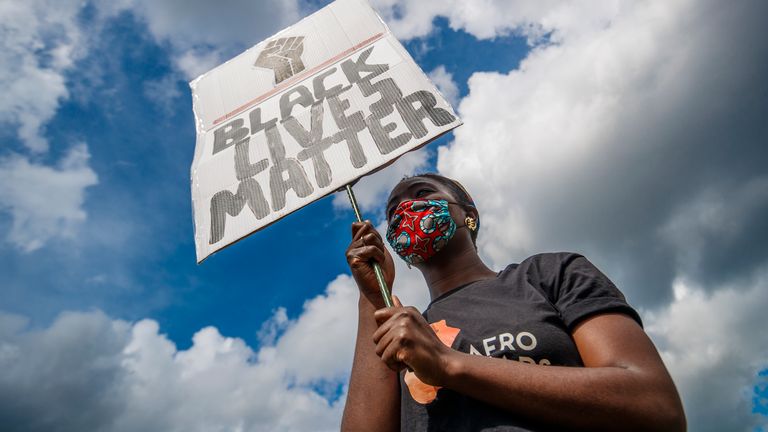Racially and religiously motivated hate crimes hit a new high across England and Wales in 2020, data has revealed.
A total of 61,851 racially and religiously aggravated offences were recorded last year – up 7% on the 57,825 in 2019.
That is more than double the 28,479 recorded in 2013 – the first year specific data was made available.
Some forces saw much bigger rises, with Leicestershire Police’s offences going up the most – by 82% to 1,297, followed by Dyfed Powys police in Wales, which had an increase of 49%.
London‘s Met Police recorded the highest number of hate offences (15,101) – a rise of 7% – followed by West Midlands Police (5,155) – an increase of 23%.
The Home Office data, which covers all 43 forces in England and Wales apart from Greater Manchester Police, also showed that in 2020, 27% of cases were closed without a suspect being identified.
This is an improvement on 2019 – when around three in 10 (31%) were shut unresolved.
Police forces said that the coronavirus pandemic and Black Lives Matter protests both contributed to a rise in hate crimes.
They did note, however, that levels of reporting had improved, which could have contributed to the spike in numbers.
A spokesperson for the Met said that the COVID-19 outbreak had a “direct impact” on levels of hate crime across the capital.
They said that “both on and offline… certain communities were targeted due to the pandemic”.
After the initial outbreak in Wuhan, China, the force said it saw more victims from Chinese or southeast Asian communities, but that trend did not continue throughout the year.
West Midlands Police said the lockdown had led to an “increase in neighbour disputes and online social media offences” related to race or religion.
While Leicestershire Police claimed that the majority of hate crime offences reported were “lower-level, such as public order”.
But it said: “We recognise that such crimes do still have a significant impact on victims and we are determined to deal with them robustly.”
In Wales, a spokesperson for Dyfed Powys Police said they had experienced “community tensions around English on Welsh and Welsh on English crimes” during the year.
At certain points in 2020, English people were banned from crossing the Welsh border and vice versa due to lockdown restrictions.
It also attributed an increase in tensions to the “protests supporting the Black Lives Matter movement” following the death of George Floyd in the US in May.
The number of hate crime offences reported to police has been rising for the past decade, according to the National Police Chiefs’ Council (NPCC).
National events, such as the Brexit referendum of 2016, COVID and Mr Floyd’s death, have led to sharp rises, the NPCC added.
The racist abuse experienced by footballers Marcus Rashford, Bukayo Saka and Jadon Sancho after they missed penalties during England’s Euro 2020 final against Italy, could prove to be another trigger.
Racially-motivated online abuse against the players came after widespread criticism of a government-commissioned race report that claimed there was “no evidence” of institutional racism in Britain.
The Sewell Report said that the UK should act as an example for “other white-majority countries” and that the system is “no longer rigged against ethnic minorities”.
But UN human rights groups later claimed the report aimed to “normalise white supremacy” and called for a new one to be launched.
Commenting on the hate crime data, Diana Fawcett, chief executive at independent charity Victim Support, said: “We have seen victims who not only live with pain and suffering after facing horrendous abuse, but who also have had their sense of safety, well-being and self-worth damaged.”
She added that they must have “confidence they will get justice from these incidences”.


